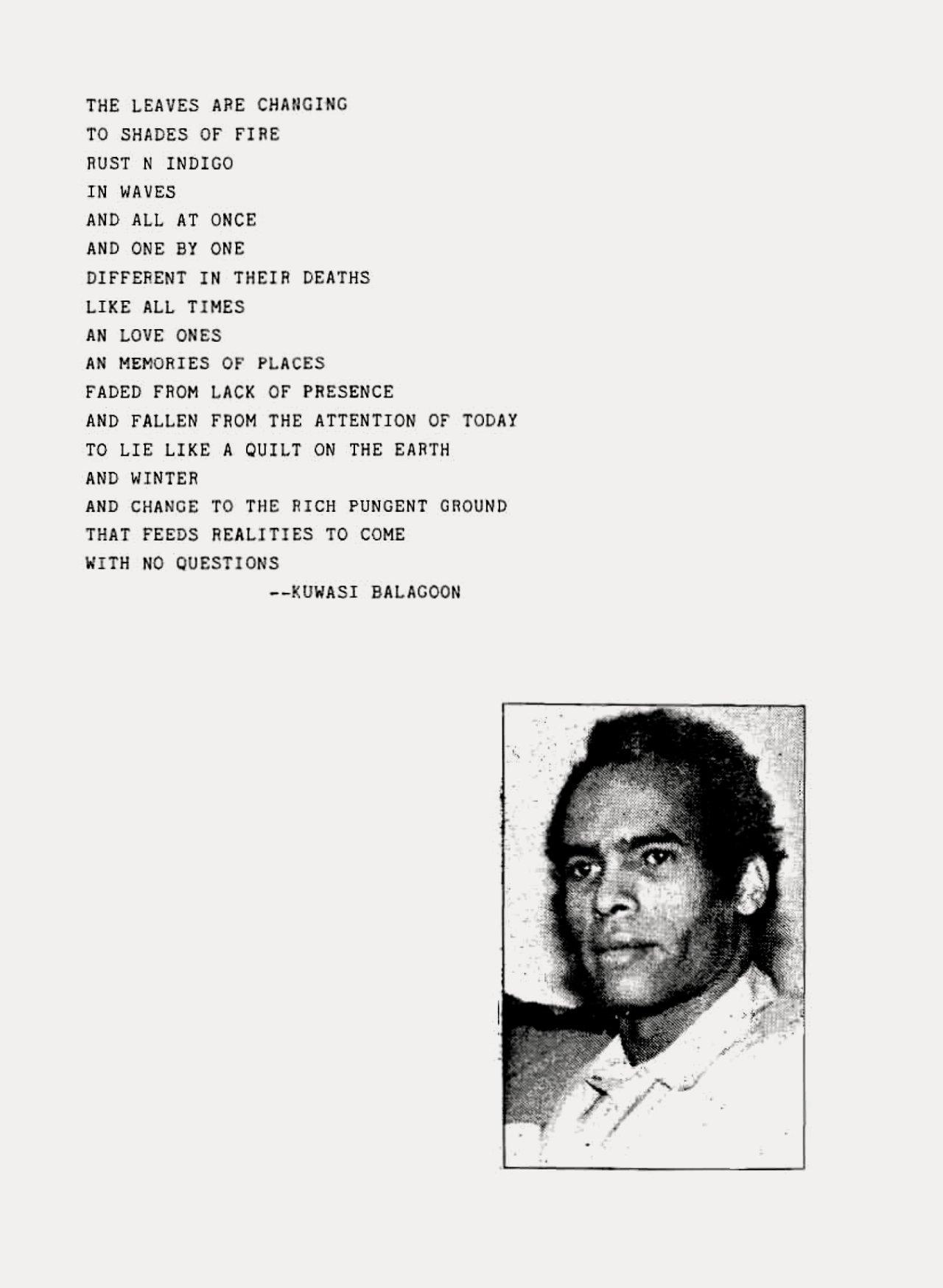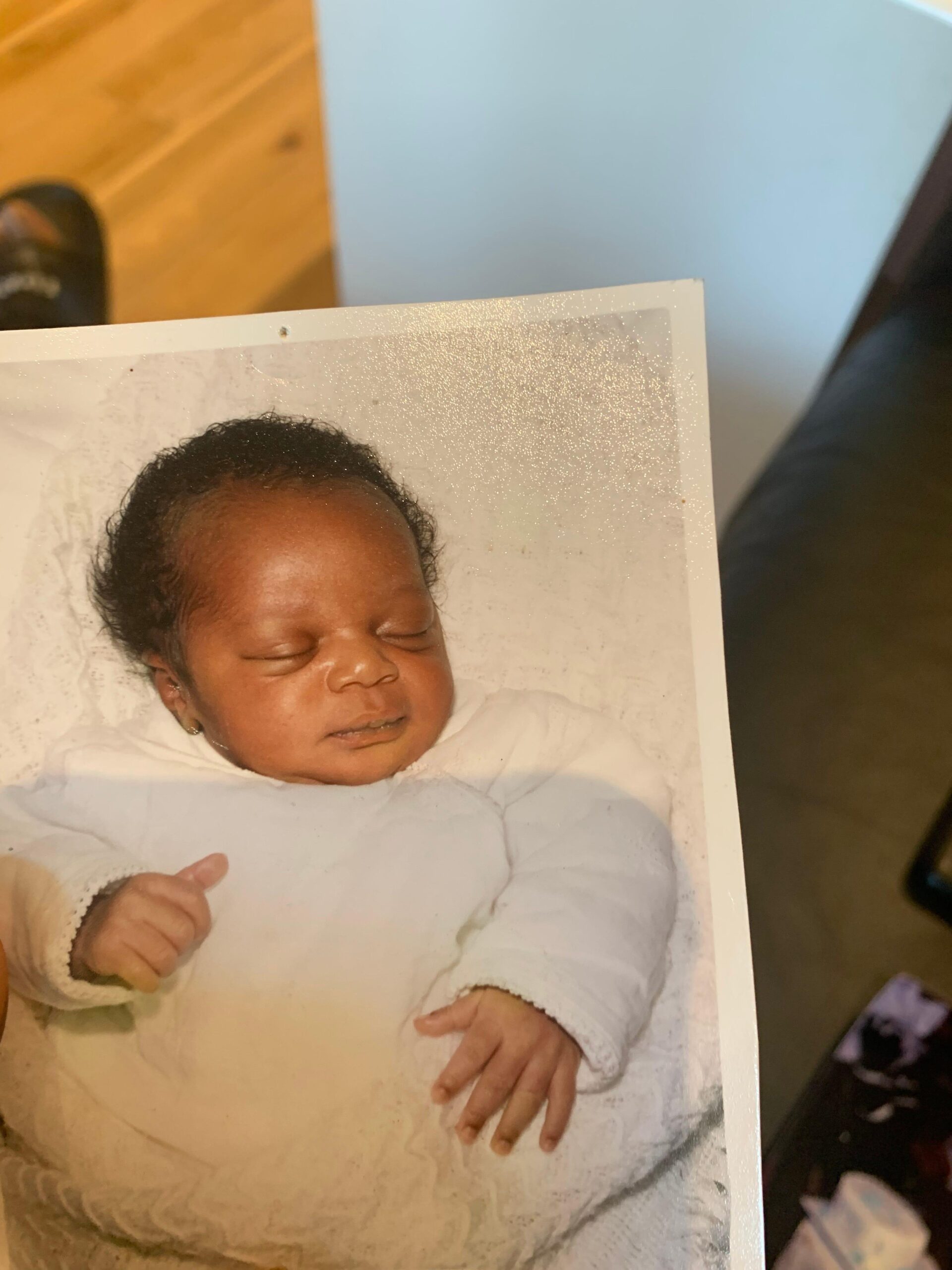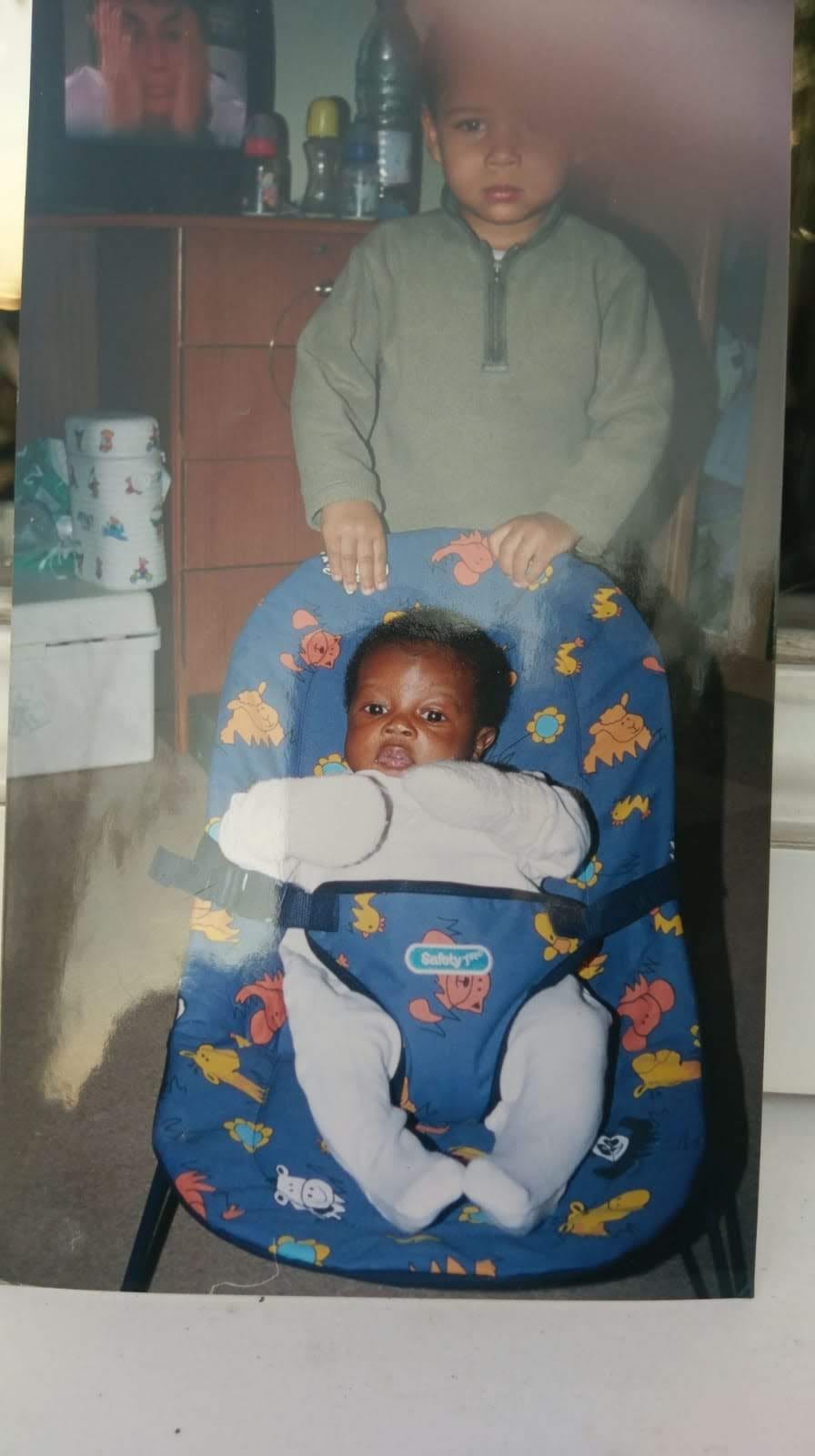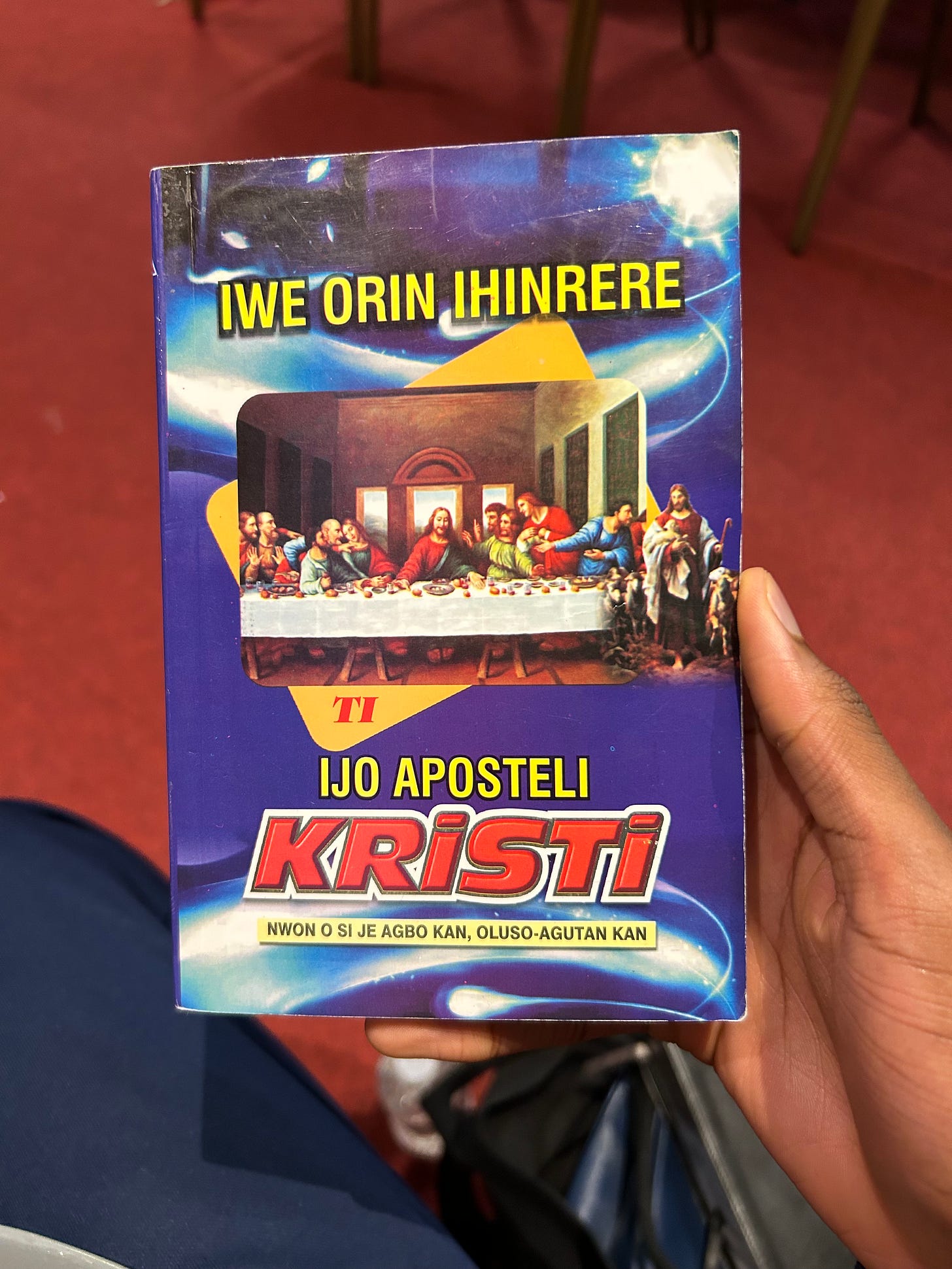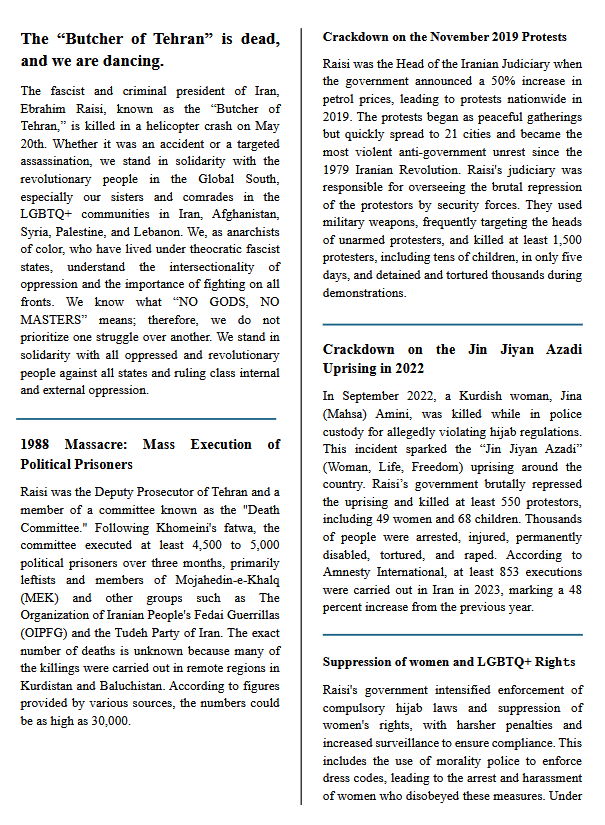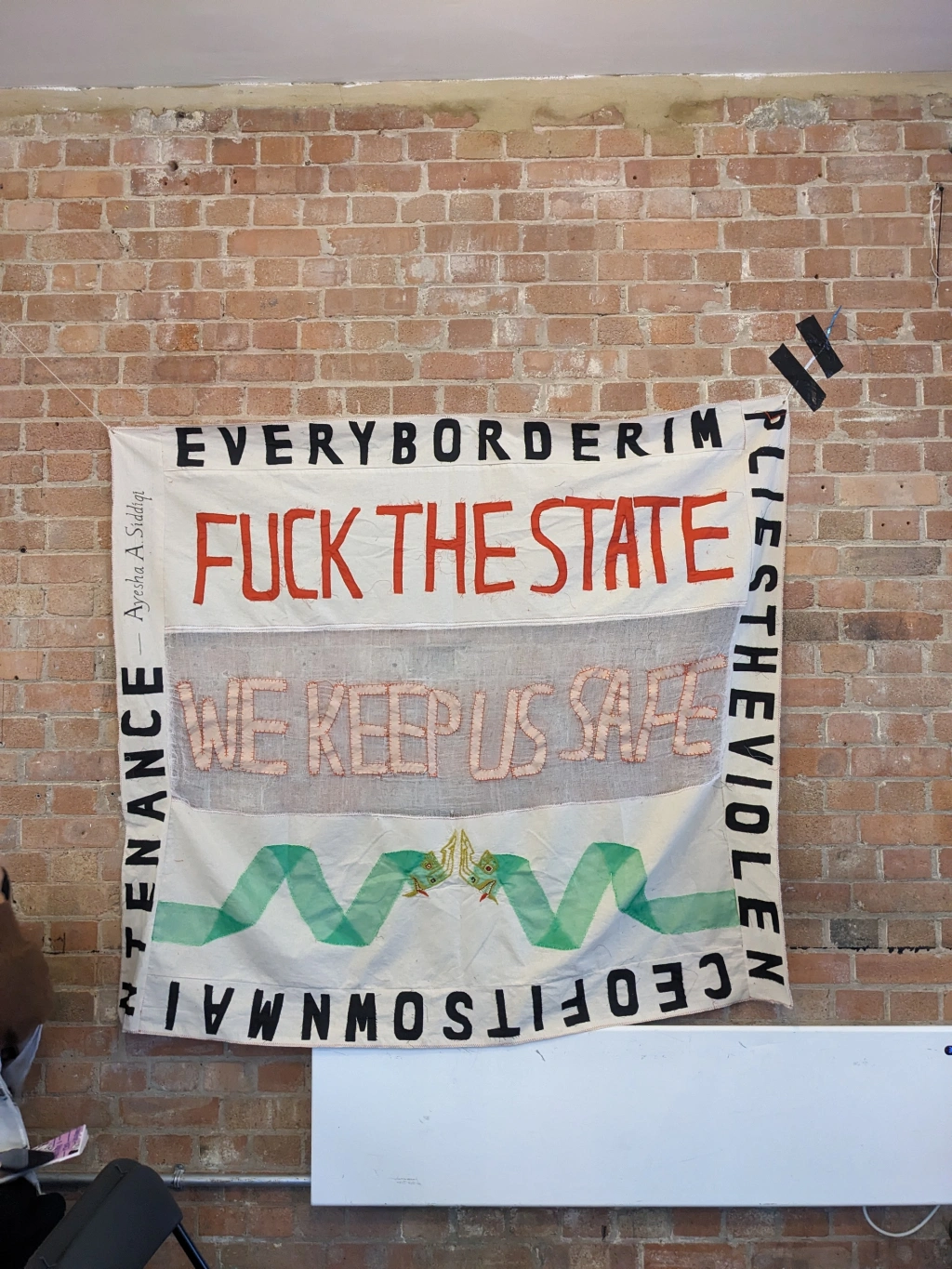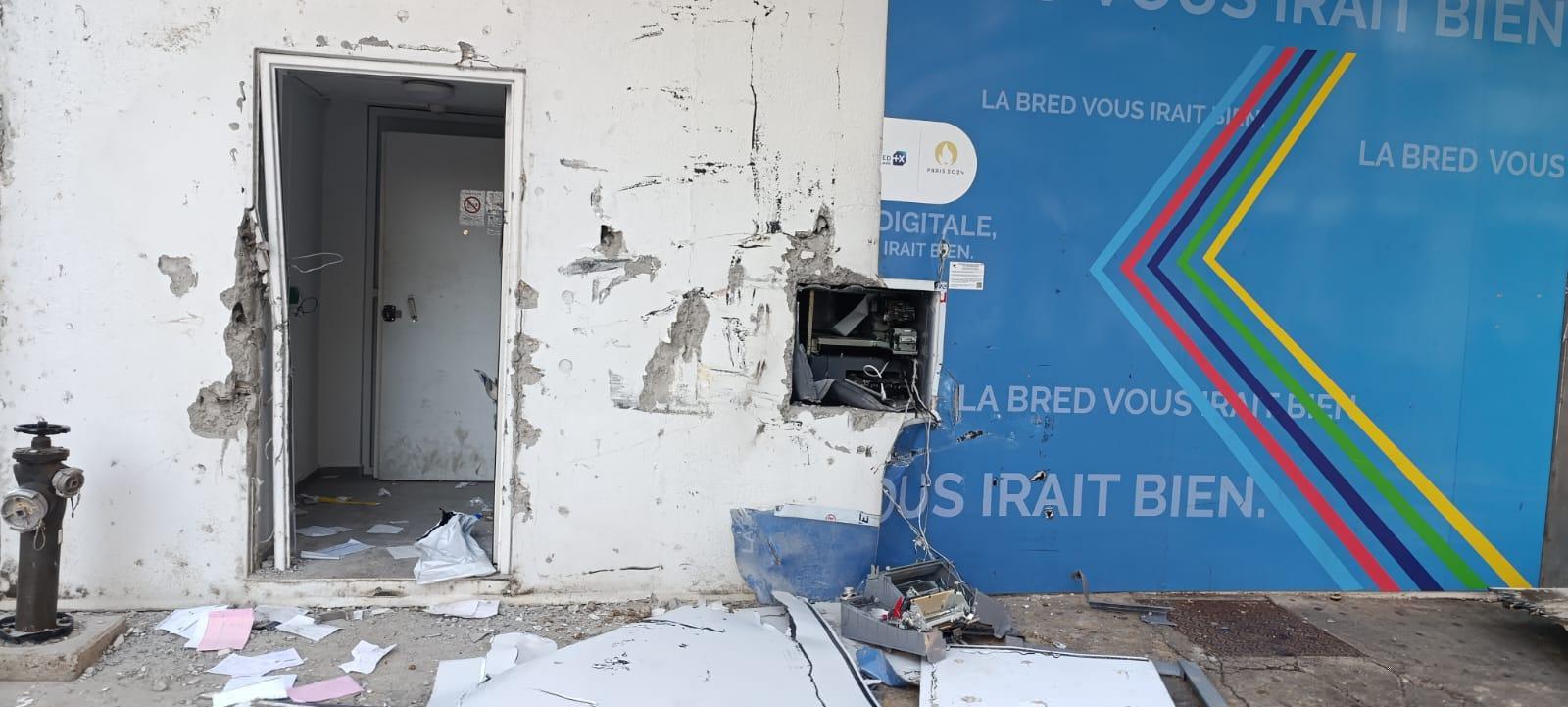Introduction
Kaneko Fumiko (1903–1926) was a Japanese anarchist living at the early part of the 20th century. Born out of wedlock into grinding poverty, she lived her life as an outsider within Japanese society including a stint with unloving and cruel relatives in then-occupied Korea, her experiences inspiring both her rebellion against authority and feelings of solidarity with others on the receiving end of society’s boot. Together with her friend, partner and, before her death, husband Pak Yol, she started underground anarchist societies, published articles against the Japanese state and society, and, perhaps, planned to kill the Emperor Taisho and then-Crown Prince Hirohito with explosives at Hirohito’s wedding.
She and Pak were some of of many who’d be swept up in the mass arrests and killings of enemies of the state both real and perceived after the Great Kanto Earthquake of 1923. Placed into “protective custody,” she and Pak were tried and sentenced to death for high treason on charges related to a plot to kill the Emperor and Crown Prince. While these sentences was later commuted to life in prison by the Emperor, an honor she promptly rejected by tearing the decree up in front of her jailers, she was found hanging in her cell in 1926 and is supposed to have committed suicide.
These interrogation transcripts provide a valuable look into the thoughts and deeds of Fumiko beyond the time of her youth detailed in The Prison Memoirs of a Japanese Woman, a memoir written during her trial. At points we see her discussing her philosophies of nihilism and individualism, and Stirner peeks through in her protest against the “phantasm” of Confucian altruism and insistence that we should be the center of all things. Her denunciation of the Emperor and the Japanese state is stirring as well, though the substance of the assassination plot which features heavily in the second interrogation included here is rather unclear because, as Helene Bowen Raddeker observes, during her interrogations she’d inflated her role in the matter to make herself appear more guilty and thus be sentenced as harshly as Pak. Though she talks about Pak’s failed attempt to procure explosives in Korea for her in the first interview featured here from 1925, she later admitted in 1926 to finding out about Pak’s attempt only after he returned. Nevertheless, she treated her interrogators to a riposte of the Emperor system fierce enough to keep her in prison even after this admission.
This pamphlet includes three interrogations: the first is excerpted from Hane Mikiso’s Reflections on the Way to the Gallows and includes her narrative about how she arrived at her nihilist philosophy as well as a denunciation of the emperor system; the second and third pieces, an original translation by myself, take place two years later than the first and were excerpted by Kurihara Yasushi in his compilation of Japanese anarchist writings, Kurizake, Freedom. These include more robust denunciations of the Emperor and Japanese society. Beyond these there exists a comprehensive transcript of Fumiko and Pak’s trials, correspondences and interrogations in court records which have also been published but are currently out of my reach. Some of their pre-trial writings are also extant, though in limited number, and virtually all of this with the exception of Fumiko’s Prison Memoirs of a Japanese Woman remains as-yet untranslated.
In addition to Memoirs, English-language resources for further information about Fumiko include the aforementioned Reflections on the Way to the Gallows, which has a short profile as well as a translation of her essay Nani ga watashi wo kou saseta ka? (What made me do what I did). Radikker’s Treacherous Women of Imperial Japan relates and analyzes the stories of both Fumiko and Kanno Suga, a Japanese anarchist executed for treason 15 years before, and includes a much more robust profile of Fumiko’s life. Raddeker’s familiarity with anarchism, Stirner and Nietzsche and access to a wide variety of source material make for a very engaging read. The tanka on at the end of this work is also taken from there (Raddeker 232).
— Max Res
New Year’s Day, 2020
Max is a part of Viscera Print Goods & Ephemera, and can be reached at viscerapvd@gmail.com.
November 22, 1923
[The following are excerpts from Kaneko’s interrogation on November 22, 1923]
Question: Why did you embrace nihilism?
Answer: Because of the circumstances of my family and ensuing social oppressions.
Q: What about your family?
A: I have no family in the true sense… I was abandoned by my parents and separated from my brothers and sisters. I had no family life. My birth was not recorded, so I was oppressed by the society. It is the fault of the social system… [After coming to Tokyo] I read the writings of Toshihiko Sakai and socialist magazines. Observing this, my parents seemed to be concerned I was inclining towards socialism. In about 1922 I became acquainted with a Korean, Pak Yeol, who was unknown and propertyless. I decided to live with him and informed my parents about this… After I started living with him my father wrote me a letter, in May of that year, contending that I was a descendant of a Chancellor of the Realm, Fujiwara-no-Fusame, [681–737] who lived over a hundred generations ago. I was besmirching this illustrious Saeki family line by living with a lowly Korean. He was disowning me and henceforth I was not to think of him as my father, he wrote. So I was disowned by my father, who had already abandoned me. Mother too had abandoned me… She even considered selling me to a whore-house… My parents bestowed no love on me and yet sought to get whatever benefit they could out of me. Theirs is a truly selfish love, a form of greed. So I, an object of greed, fail to understand the meaning of filial piety. The so-called morality is based on the relationship between the strong and the weak. That morality is always manipulated to serve the convenience of the strong. That is, the strong insists on preserving his freedom of action while demanding the submission of the weak. From the standpoint of the weak, morality means an agreement that calls for one’s submission to the strong. This moral principle is common through all ages and all societies. The primary aim of those in power is to preserve this moral principle as long as possible. The relationship between parents and children is also based on this principle. It is only coated over the with attractive-sounding term “filial piety.”
Q: How did you come to associate with socialists and eventually arrive at nihilism?
A: Three intellectual groups influenced me while I was peddling newspapers… One was a Buddhist salvation group, the second was the Christian Salvation Army group who beat their tambourines, and the third, the long-haired socialists who cried out in desperate voices… I first approached the Salvation Army.
[She then relates her experiences with Saitō – identified in her memoirs as Itō. She explains she grew disillusioned with Christianity when he said he had to end his friendship with her because he had fallen in love with her.]
What an extraordinary contradiction for a Christian to preach love on the street corner then fail to follow through on a pure, unblemished love. Christians have become fettered to the concept of God which they created. Theirs is a cowardly faith of slaves. The virtue and beauty of human beings is to live naturally, ungoverned by external forces. I decided that I could not embrace Christianity, which preaches the doctrine of life that conflicts with the ideals of beauty and virtue. So I abandoned Christianity…
[She was then befriended by a socialist, Hori Kiyotoshi, but she became disillusioned with him also because Hori, she claimed, was a hypocrite. He concealed his relationship with his geisha wife, fearing it would hinder his chances of getting ahead in the world. He also made all of those under him do all the work in his printing business while he idled his time away.]
I was also introduced to another socialist, Kutsumi Fusako. Her family life and principles were no different than Hori’s. Kutsumi took care of her own personal needs but paid no heed to her children’s needs. She would find some excuse to go out with a young man and stay out all day long. I heard her remark that all she had to do was to get on the platform and make a speech about socialism and say “The present society must be destroyed” to get the police to intervene. The next day the papers would report that Kutsumi Fusako made an extremist speech, and so the police prevented her from speaking. I got disgusted with the widespread desire among socialists to get their names in the paper. At this time Kutsumi had no money even to buy food, so she pawned my clothes. She then let the redemption period expire and allowed the pawnshop to sell them without my permission. I am not complaining about losing my clothes, though she knew that I needed them because winter had come. She showed no sense of responsibility. I detested her attitude, a socialist who gives no thought to other people’s needs and thinks only of feeding herself.
I had imagined that socialists were people that rose above the meaningless customs and morality of the society. I imagined them to be courageous fighters with no interest in so-called fame and honor and social reputation. I thought they were warriors fighting to destroy the perverted society of today and striving to create an ideal society. However, even though they denounce the irrational and hypocritical aspects of the society, and pretend that they are indifferent to social criticisms and to fame and reputation, they in fact are governed by and are concerned about the standards of the mundane society. They seek to adorn themselves with conventional ornaments, and take upon themselves conventional values. Just as generals take pride in the medals on their chests, socialists covet records of arrests in order to earn their bread. They take pride in this. When I realized this fact I gave up on them.
I also came to be appalled at the somnolence of the peasants, who are mired in pain but feel no pain, and the ignorance of the workers, who work diligently while they are being devoured to their bones. If the chains that bind them are removed, they are likely to go to the wielders of political and economic power with their chains and beg them to chain them up again. Perhaps they will be happier if they are allowed just to sleep in ignorance. So I got disgusted at all the currents of thought and from the spring of 1922 tightly embraced the nihilistic beliefs I hold today.
As for the significance of my nihilism… in a word, it is the foundation of my thoughts. The goal of my activities is the destruction of all living things. I feel boundless anger against parental authority, which crushed me under the high-sounding name of parental love, and against state and social authority, which abused me in the name of universal love.
Having observed the social reality that all living things on earth are incessantly engaged in a struggle for survival, that they kill each other to survive, I concluded that if there is an absolute, universal law on earth, it is the reality that the strong eat the weak. This, I believe, is the law and truth of the universe. Now that I have seen the truth about the struggle for survival and the fact that the strong win and the weak lose, I cannot join the ranks of the idealists and adopt an optimistic mode of thinking which dreams of the construction of a society that is without authority and control. As long as all living things do not disappear from the earth, the power relations based on this principle [of the strong crushing the weak] will persist. Because the wielders of power continue to defend their authority in the usual manner and oppress the weak—and because my past experience has been a story of oppression by all sources of authority—I decided to deny the rights of all authority, rebel against them, and stake not only my own life but that of all humanity on this endeavor.
For this reason I planned eventually to throw a bomb and accept the termination of my life. I did not care whether this act would touch off a revolution or not. I am perfectly content to satisfy my own desires. I do not wish to help create a new society based on a new authority in a different form.
Q: What is your opinion concerning the Japanese state and social system?
A: I divide the Japanese state-social system into three levels:
The first class is the royal-clan members.
The second class is the government ministers and other wielders of political power.
The third class is the masses in general.
I regard the first class, the royal clan, as pitiful victims who live like prison inmates whose comings and goings are strictly regulated, just as they are for the imperial regent. I think they are pitiful puppets and wooden dolls who are being manipulated by the second class, the real wielders of power, in order to pull the wool over the eyes of the masses. The third class, the masses, as I mentioned earlier, are ignorant beyond salvation. The second class, the wielders of political power, are the ones who have the real power to persecute the weak, like myself. For that reason I feel nothing but bitter hatred toward this class. Whereas in reality the second class is the actual wielder of power, the first class is the formal wielder of power. So these two classes go hand in hand. Consequently I place the second class on the secondary level and direct my rebellious sentiments against the first class. I also contemplated throwing bombs at both classes. Pak Yeol and I talked about this.
I am keeping a journal of my days in prison. On November 6 I wrote: “The rights of the people are being tossed about by the wielders of power as easily as if they were handballs. The government officials have finally thrown me in prison. But let me give you some sound advice. If you wish to prevent the current incident from bearing fruit, you must kill me. You may keep me in prison for years but as soon as I am released I will try the same thing. I will destroy my own body and save you the trouble. You may take this body of mine anywhere you please, to the guillotine if you wish or to the Hachiōji prison. We all have to die eventually. So you may do as you please. You will only be proving that I lived true to myself. I am perfectly happy with that.” You expect me to compromise with you people, changing my way of thinking, and live in conformity with the ways of the society? If I could compromise with you now, I would have compromised with you when I was out in society. You don’t have to preach to me about that. I have enough sense to understand that. I am prepared for whatever you may do to me. So do as you please. Don’t hesitate. To tell you the truth, I would like to go out into the world once more. I know that all I have to do is make my bid by saying “I have undergone a change of heart,” and bow my head. But I cannot destroy my current self so that my future self can survive.
Officers, let me proclaim courageously to you once more: “Rather than prostrate myself before the wielders of power, I prefer to die and be true to myself. If this displeases you, you may take me anywhere you wish. I am not afraid of anything you may do to me.” This is the way I have felt in the past and it is the way I feel now.
Q: Did you become acquainted with Pak Yeol after you developed this manner of thinking?
A: That’s right. After I met Pak we talked about our ideas and found that our views were similar. So in order to work together we began to live together.
[During the course of the interrogation Kaneko revealed her opinion about the emperor system candidly.]
Even before I met Pak Yeol I believed that the emperor was a useless entity. Pak and I got together because we agreed about this. We joined hands as comrades to overthrow the emperor system. By nature human beings should be equal. And yet human beings who are equal by nature have been made unequal because of the presence of the entity called the emperor. The emperor is supposed to be august and exalted. Yet his photograph shows that he is just like us commoners. He has two eyes, one mouth, legs to walk with and hands to work with. But he doesn’t use his hands to work and his legs to walk. That the only difference. The reason I deny the necessity of the emperor rises from my belief that human beings are equal.
We have been taught that the emperor is a descendant of the gods, and that his right to rule has been bestowed upon him by the gods. But I am convinced that the story of the three sacred treasures [the sword, the mirror, and the jewel, which come down from the age of the gods as emblems of imperial authority] is simply a myth plucked out of thin air. If the emperor were a god, then his soldiers would not die. Why were tens of thousands of royal subjects killed by the Great Earthquake in his immediate presence? We have in our midst someone who is supposed to be a living god, one who is omnipotent and omniscient, an emperor who is supposed to realize the will of the gods. Yet his children are crying because of hunger, suffocating to death in the coal mines, and being crushed to death in factory machines. Why is this so? Because, in truth, the emperor is a mere human being. We wanted to show the people that the emperor is an ordinary human being just like us. So we thought of throwing a bomb at him to show that he too will die just like any other human being.
We have been taught that the Japanese national polity consists of an unbroken lineage of the imperial family throughout the ages. But the imperial genealogy is really fuzzy. And even if the genealogy is unbroken through the ages, it signifies nothing. It is nothing to be proud of. Rather, it is shameful that the Japanese people have been so ignorant as to acquiesce in having babies foisted upon them as emperors.
Under the emperor system, education, laws, moral principles were all devised to protect the imperial authority. The notion that the emperor is sacred and august is a fantasy. The people have been led to believe that the emperor and the crown prince represent authorities that are sacred and inviolate. But they are simply vacuous puppets. The concepts of loyalty to the emperor and love of nation are simply rhetorical notions that are being manipulated by the tiny group of privileged classes to fulfill their own greed and interests.
This translation, including paraphrasing and footnotes, can be found in Mikiso Hane’s Reflections on the Way to the Gallows: Rebel Women in Prewar Japan.
May 14th 1925
52nd Interrogation Record May 14th 1925 Ichigaya Prison
(Opening omitted)
Question 1: Is your statement from last time correct that the idea of asking Kim Han for explosives in order to use them during the Crown Prince’s wedding emerged from your discussions with Pak?
Answer: That’s correct.
Q2: Is it also correct that your asking Kim Han for explosives was also in preparation for the Crown Prince’s wedding?
A: I learned they’d be holding a wedding ceremony for the little prince in the near future around the time Pak went to Gyeongseong to make contact with Kim Han.
I recall that at the time the date for the little prince’s wedding hadn’t been firmly decided. In any case, I’d anticipated the wedding procession being held in the near future. I remember it was due to this that Pak went to Gyeongseong so I’d have a bomb in time for this incredible opportunity of a procession.
Q3: Was there a discussion between you and Pak when he left for Gyeongseong about being on time for the wedding ceremony?
A: I talked continuously with Pak about presenting a bomb to the young prince during the Imperial wedding ceremony. Whether that was something that happened before he left for Gyeongseong, or whether it was after, I can’t clearly remember right now. In any case, because from the time Pak left for Gyeongseong I thought using a bomb at the wedding ceremony was best, I think Pak probably told Kim Han to give us a bomb in time for it.
Q4: After returning from Gyeongseong, did Pak tell you that he’d discussed with Kim Han about having bombs in time for the wedding?
A: I didn’t hear from Pak that he’d had that kind of conversation. The only thing he told me after coming back from Gyeongseong was that Kim Han would finally be sharing bombs with us.
Q5: In that case, from the time Pak returned from Gyeongseong at the end of 1922, did you discuss how you wouldn’t be able to get bombs from Kim Han due to the Kim Sang-ok incident, and about using them at the ceremony once you got the bombs from him at the end of 1923?
A: There were many conversations between myself and Pak about using the bombs at the ceremony, but I don’t have any certain memories left of whether they happened at that time or what.
Q6: What about at the time of your involvement with Kim Jun-han?
A: I remember clearly at that time there was a conversation between Pak and I about using the bombs at the procession.
Q7: Who were you going to throw the bombs at?
A: Ultimately, we’ll be happy as long as we bag the little prince.
It’d be good to kill the Emperor too, but the procession was a rare opportunity and the Emperor’s a sick man, so the value of the statement we’d make killing him instead of the little prince would be different and not worth it. So we targeted the little prince.
Q8: Once you got the bombs, who was supposed to throw them?
A: Of course myself and Pak were, but I also had the thought of asking other comrades like Nīyama, Choi Gyujong, and Yamamoto Katsuyuki to do it.
The idea I had in mind was, because Nīyama and Yamamoto had been worried about chest troubles for a while and were prepared to die, and Choi’s the kind of person who, once fired up, will do any kind of direct action, Pak and I could have these three divide up and throw bombs into places like the Diet, Mitsukoshi, the police headquarters and the Imperial Palace at the same time we were throwing ours.
But then, with regards to Nīyama, after she’d fallen into a romantic relationship with Kim Jun-han we felt her character wasn’t fit for this kind of direct action and we dropped the plan to use our comrades.
Q9: Was throwing a bomb at His Majesty the Crown Prince your only objective?
A: Ultimately we’d have been happy just killing the little prince, but if able we’d have liked to kill him along with the Prime Minister and other true political power holders. But as we’d been slow to take the opportunity once we’d gotten our hands on the bombs, and if we’d been caught by the officials we’d have really looked stupid as I myself do sitting here, we considered that if we really didn’t have the chance we’d set our eyes on the sending a message route, and considered throwing the bombs during events like the May Day celebrations or the opening of the Diet.
Q10: Did Pak have the same main intent as you of throwing a bomb at His Majesty?
A: He did.
Q11: Why did you attempt to cause to such harm to His Majesty the Crown Prince?
A: For a long time I’ve thought deeply that all humans are equal. Everyone being human, they must all be equal. In that there’s no difference between stupid and smart or strong and weak. As humans that exist naturally on earth, I believe that all humans are completely equal in value, and following from the sole qualification of being human they should enjoy completely and equally their right to human activity.
To put it concretely, all actions that have been done, are being done and can be done by humans are built on the foundation of their being human. Thus I think all of these actions, built on a natural foundation and performed by humans on the earth, should be recognized as equal human activities by the sole qualification of their being done by humans. And yet, how very much these natural actions, this natural existence itself, are being denied and controlled in the name of laws made by humans. Humans who should be by nature equal, how unequal their situation is in this society. I curse this inequality. Only two or three years ago, I thought of the so-called nobility of the upper class like a peculiar race, endowed with a shape and substance in every way different from the so-called commoners. As a matter of fact, even looking at pictures in the newspaper you can see that the so-called nobility aren’t in any way different from the commoners. With two eyes, one mouth, two legs for walking and hands to work with, it seems they’re not lacking in the least.
Actually, I didn’t think a deformed child [sic] lacking those things could ever be a part of such a class.
This understanding of, in short, the class of the Imperial household, the understanding that when you speak of them you instinctually feel like you’re speaking of noble, inviolate people, is something that’s likely been entrenched in the hearts of the people. To put it differently, things like Japan’s states and rulers have tapped a bit into this vein of popular understanding.
From the start, things like countries, societies, peoples and rulers are nothing but ideas. Nevertheless, in order to bestow the rulers of these ideas with majesty, political power and holiness, there exists in this very Japan something that represents what I just wrenched out—the divine right of kings. Just as anyone born on Japanese soil is instilled with this idea, even grade school students, in order to impress upon the guileless people notions like the Emperor himself being descended from the gods, or his right to rule being something bestowed by decree of the gods, or else the Emperor being someone who controls the power of the State in order to realize the will of the gods, and thus the law is the will of the gods, they base these things in fantastic legends, vaunting and solemnly offering praise to things like a mirror, a sword and a jewel like they were given by the gods, completely deceiving them. The poor deceived people, engulfed in these absurd legends, consider things like the government and Emperor to be incredible gods beyond compare, but if the Emperor was a god himself or descended from the gods, if the people were under the protection of these gods, existing under the spirits of successive generations of these god-emperors, no Japanese soldiers should have to die in times of war, not one Japanese airplane should fall from the sky, and some tens of thousands of loyal subjects shouldn’t die in the gods’ own backyard due to a natural disaster like the one last year.
But this unbelievable thing that became an unwavering truth, that is the divine right of kings which is nothing more than a supposition, isn’t it proven all too clearly that the legends in which it’s grounded are empty? And regardless of whether an Emperor who’s the almighty omnipotent manifestation of the gods and implementing the will of the gods truly exists on earth or not, don’t some of this society’s children that exist under him cry from hunger, suffocate in coal mines, and die miserable deaths crushed by machines? And isn’t this enough evidence of the truth, namely that the Emperor is just a lump of meat, someone in every way the same as the so-called public, and that everyone should be equal to him? Wasn’t it the same for you, officer? I was taught in elementary school that because our sole glory as human beings was having the fortune to be born into the nation without compare that is this country, where we live under an Emperor who’s part of a continuous, unbroken line, we had to put our effort into enhancing this glory. And while I don’t know whether their being of one bloodline is true or not, in any case is it such a great honor to be ruled by a single lineage? I’ve heard before of an Emperor who drowned and became fish food, Antoku or something, that bore the responsibility of ruler of Japan at a mere two years old. Is vaunting such an incapable human being as their ruler really the glory of the ruled? Rather, granting some ten thousand year imperial line the power to govern even as a formality is the deepest shame of people born on Japanese soil, and proof of the ignorance of the Japanese people.
Last year’s tragedy, where many people burned to death by the side of the currently breathing Emperor, was something that proved he’s actually just a foolish lump of meat and at the same time scorns the foolishness and naivete of people in the past.
Schooling endeavors first to teach humans who exist naturally on earth the word for “flag” and instill in them the spirit of nationalism. And the wide variety of activities that are all equally founded in their being done by humans, all of these are divided into right and wrong under the single standard of whether they support authority or not. And that standard is human-made law and morality.
The police, who administer the law which teaches only the path to a better life for society’s victors and submission to authority, lower their sabers and menace human actions, taking everyone who they fear might shake the pillars of power and bam, bind them up one and all. And the judges, those respectable officials, flip through law books and hand down arbitrary judgments on human actions, alienating themselves from human lives, denying even their humanity as they undertake their duty as protectors of authority.
Like when Christianity was at its height and, in order to protect its sanctity, they banned scientific research for fear of shaking the pillars of the superstitious miracles of God and long-held traditions they preached, things like the sanctity of the State or the holiness of the Emperor are also ephemeral, and force is used to oppress those ideas and arguments that would expose them as nothing more than illusions.
Thus the earth is currently occupied and being trampled upon by a devil called power, because the lives which should by their nature be enjoyed by humans who are natural existences on the earth are only permitted if they fulfill the mission of serving it.
And the representatives of the devil called power that’s trampling upon the lives of the humans on the earth who should all be equal are the Emperor and the Crown Prince. All the reasons for targeting the little prince I’ve given up to now proceed from this idea.
And for those representatives of power who trample upon the lives of the naturally equal humans on the earth, those lumps of meat equal to lumps of dirt called the Emperor and Crown Prince, the poor people they’ve deceived give them an exaggerated holiness and provide them superior, inviolate positions while they’re being exploited. And it’s there that I wanted to show the people clearly that those being impressed upon them then as sacred inviolate power, the Emperor and Crown Prince, are in truth empty lumps of meat among lumps of meat, nothing but puppets, to show those being exploited that they’re nothing more than marionettes and foolish dummies used by the privileged few to enrich themselves by deceiving the people who serve as their source of wealth, and through this to show that the mountain of long-held traditions that bestow the Emperor with divinity are purely empty superstitions. To show, because the empty substance of this Japanese nation that’s considered the land of the gods is nothing more than a provisional system for increasing the personal gains of the privileged few, the ideology of self-sacrifice for the nation called “loyalty and patriotism” that’s glorified and propagandized and even considered a national slogan being in truth nothing more than a cruel desire to sacrifice the lives of others for their own benefit wrapped up in pretty adjectives as a means of indulging their self-interest. I targeted the little prince to warn the people that consenting to this uncritically means consenting to being a slave to the privileged few, to let people know that the fundamental altruistic morality demanded by the Confucianism that Japanese people up to now have held as their life’s creed, that slave morality that subdues the people’s hearts today and even in that action inclines them to being ruled, is in truth an illusion emerging from sheer conjecture, just an empty phantasm, and in letting them know that, opening their eyes to see that people should act entirely for themselves, that the ones who make the universe are they themselves, and thus every “thing” exists for them and everything should be done for them.
I thought in any case that by throwing that bomb, I’d soon be putting an end to my life on this earth. The reason I’ve just told you for targeting the little prince, with the idea being to make a declaration to the outside world, that is, an explanation for the people, this scheme was in fact something consisting of my reflections made to hold a faint color of hope and nothing more, in other words it was me extending outwards thoughts that had been directed towards myself, which is all to say that thoughts which had myself as their object were at the root of this plan.
Regarding thoughts which have myself as their object, what’s referred to as my nihilistic ideology, I already talked about this in detail last time. To follow my plan to its logical conclusion, the negative goal was to negate my own life, and the positive, ultimate goal, the heart of the plan itself, was the destruction of all power on this earth.
This is why I targeted the little prince.
Q12: How is your physical health?
A: My health? That was resolved a long time ago.
Q13: Have you reformed yourself?
A: I’ve done absolutely nothing I need to repent for. Indeed you could say that my ideas and actions, my plan are all bad because they’d cause trouble for other people, but at the same time they’re things that I myself benefit from.
Judging things according to your interest certainly isn’t bad; rather, it’s human nature, a condition for living. If judging things according to your interest was bad, the blame would be on the fact that humans themselves are alive. To me, things that are to your benefit are good, and things to your disadvantage are bad.
But I didn’t carry out this plan because I believed it was good. I only did it because I wanted to. Just as no matter how I’m criticized as being bad by other people, I don’t stray from my path, no matter how you might flatter me for being good, if I don’t want to do something, I’m not doing it.
I’ll keep doing things because I want to. I can’t predict what those things will be, but what’s certain is as long I exist above ground I’ll be living in the moment, pursuing the things I most want to do from one to the next.
July 18th 1925
1st Interrogation Record July 18th 1925 Ichigaya Prison Kaneko Fumiko (interrogation document)
Regarding the case of the aforementioned defendant being charged under Article 73 as well as with violating the Explosives Control Act, the following interrogation took place in Ichigaya Prison on July 18th 1925, being carried out with Judge Tatematsu Kaisei of the Tokyo Appeals Court, charged with the preliminary hearing under the special power belonging to the Supreme Court, and Secretary Okuyama Gunji of the same court in attendance.
Question 1: Your name?
Answer: Kaneko Fumiko.
Q2: Age?
A: Officially I’m 24, though I’m 22 by my recollection. But to tell you the truth, I don’t believe in either. And what’s more, I don’t need to believe. No matter how old I am, it has nothing to do with me living my own life right now.
Q3: Your class?
A: A divine commoner.
Q4: How are you employed?
A: My job is tearing down everything that currently exists.
Q5: Place of residence?
A: Tokyo Prison.
Q6: Permanent address?
A: Yamanashi Prefecture, Higashi-Yamanashi District, Suwa Village, 1236 Somaguchi.
Q7: Place of birth?
A: Yokohama City.
Q8: Do you hold any rank, decoration, insignia for military service, retirement, pension, or public office?
A: You can’t give me any of that stuff, and even if you could I wouldn’t take them.
Q9: Have you ever been sentenced for anything?
A: I’ll be receiving one soon, won’t I?
Q10: Have you read the official change of jurisdiction document for you and the other defendants?
A: I have.
Q11: Are there any discrepancies in the facts recorded in that document?
A: There aren’t.
Q12: On that point, do you have any comments on the Attorney General prosecuting you and Pak Jun-sik in this way and requesting the preliminary hearing from the Supreme Court?
At this time the judge has begun reading the section entitled “Indictments of the Preliminary Hearing Request.”
A: No comment.
Q13: And on the intent to have me carry out the preliminary hearing by order of the Head of the Supreme Court?
A: No objection.
Q14: Are there any errors in what you’ve said at the preliminary hearing of your case in Tokyo District Court for violating the Security Police Law and Explosives Control Act?
A: There aren’t.
Works Cited
Hane, Mikiso. Reflections on the Way to the Gallows: Rebel Women in Prewar Japan. University of California Press, 1988.
Kurihara, Yasushi. Kuruizake, Freedom: Anarchism Anthology. Chikuma Shobou, 2018.
Raddeker, Helene Bowen. Treacherous Women of Imperial Japan: Patriarchal Fictions, Patricidal Fantasies. Routledge, 1997.
Bent over,
watching others from beneath
my thighs —
the state of the world I
need to look at, upside-down.Kaneko Fumiko
[1] Raddeker 70.
[2] Tokyo District Court Interrogation Records for November 22, 1923.
[3] Setouchi Harumi, ed., Onna no Isshō, Jimbutsu Kindai Joseishi, Hangyaku no Onna no Roman, 8 vols. (Tokyo: Kōdansha, 1980), VI: 168–69.
[4] Sang-ok, a member of the resistance to the Japanese occupation of Korea, threw a bomb into the Jongno police station in Seoul in January 1923, dying in a shootout with the police a few days later.
[5] An associate of Fumiko and Pak’s, they belonged to a number of radical groups together and likely parted ways due to arguments between he and Pak in August of 1923.
[6] A Japanese department store chain.
[7] Meiji society was divided into formal class positions of nobility, those descended from samurai households, and commoners.
[8] Items known as the Three Sacred Treasures (sanshu no jingi). According to legend they were brought to earth by the ancestor of the Japanese imperial line.
[9] The Great Kanto Earthquake of 1923, in which more than 140,000 are estimated to have died, many engulfed in fires which broke out as a result.
[10] Antoku (1178–1185) was drowned by his grandmother when she jumped overboard during a navel battle rather than risk him being captured.
[11] This is the first interrogation since she was indicted on additional charges.
[12] The crime of high treason under the Meiji criminal code.
[13] Radikker sees this as a provocation towards the Emperor’s divine status (234).
[14] Pak Yol’s birth name.
